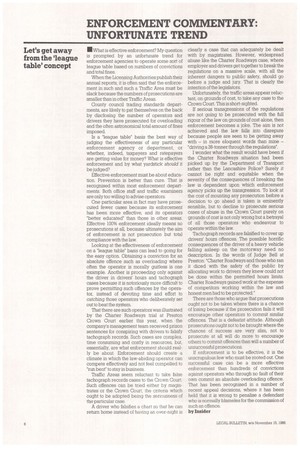Let's get away from the 'league table' concept
Page 48

If you've noticed an error in this article please click here to report it so we can fix it.
"'What is effective enforcement? My question is prompted by an unfortunate trend for enforcement agencies to operate some sort of league table based on numbers of convictions and total fines.
When the Licensing Authorities publish their annual reports, it is often said that the enforcement in such and such a Traffic Area must be slack because the numbers of prosecutions are smaller than in other Traffic Areas.
County council trading standards departments, are likely to pat themselves on the back by disclosing the number of operators and drivers they have prosecuted for overloading and the often astronomical total amount of fines imposed.
Is a "league table" basis the best way of judging the effectiveness of any particular enforcement agency or department, or whether, indeed, taxpayers and ratepayers are getting value for money? What is effective enforcement and by what yardstick should it be judged?
Effective enforcement must be about education. Prevention is better than cure, That is recognised within most enforcement departments. Both office staff and traffic examiners are only too willing to advise operators.
One particular area in fact may have prosecuted fewer cases because its enforcement has been more effective, and its operators "better educated" than those in other areas. Effective IDA enforcement ideally means no prosecutions at all, because ultimately the aim of enforcement is not prosecution but total compliance with the law.
Looking at the effectiveness of enforcement on a league table" basis can lead to going for the easy option. Obtaining a conviction for an absolute offence such as overloading where often the operator is morally guitless is one example. Another is proceeding only against the driver in drivers' hours and tachograph cases because it is notoriously more difficult to prove permitting such offences by the operator, instead of devoting time and effort to catching those operators who deliberately set out to beat the system.
That there are such operators was illustrated by the Charter Roadways trial at Preston Crown Court earlier this year, when the company's management team received prison sentences for conspiring with drivers to falsify tachograph records. Such cases are complex, time consuming and costly in resources, but, essentially, are what enforcement should really be about. Enforcement should create a climate in which the law-abiding operator can compete effectively and not feel compelled to "run bent" to stay in business.
Traffic Areas seem reluctant to take false tachograph records cases to the Crown Court, Such offences can be tried either by magistrates or the Crown Court, the criteria which ought to be adopted being the seriousness of the particular case.
A driver who falsifies a chart so that he can return home instead of having an over-night is clearly a case that can adequately be dealt with by magistrates. However, widespread abuse like the Charter Roadways case, where employer and drivers get together to break the regulations on a massive scale, with all the inherent dangers to public safety, should go before a judge and jury. That is clearly the intention of the legislators.
Unfortunately, the traffic areas appear reluctant, on grounds of cost, to take any case to the Crown Court. This is short-sighted.
If serious transgressions of the regulations are not going to be prosecuted with the full rigour of the law on grounds of cost alone, then enforcement becomes a joke. The aim is not achieved and the law falls into disrepute because people are seen to be getting away with in more eloquent words than mine "driving a 38-tonner through the regulations".
I wonder what the result would have been if the Charter Roadways situation had been picked up by the Department of Transport rather than the Lancashire Police? Surely it cannot be right and equitable when the severity of the consequences of breaking the law is dependent upon which enforcement agency picks up the transgression. To look at the cost of mounting any prosecution before a decision to go ahead is taken is eminently sensible, but to decline to prosecute serious cases of abuse in the Crown Court purely on grounds of cost is not only wrong but a betrayal of all those operators who endeavour to operate within the law.
Tachograph records are falsified to cover up drivers' hours offences. The possible horrific consequences of the driver of a heavy vehicle falling asleep on the motorway need no description. In the words of Judge Bell at Preston: "Charter Roadways and those who ran it diced with the safety of the public by allocating work to drivers they knew could not be done within the permitted hours limits. Charter Roadways gained work at the expense of competitors working within the law and honest men had to be protected."
There are those who argue that prosecutions ought not to be taken where there is a chance of losing because if the prosecution fails it will encourage other operators to commit similar offences. That is a defeatist attitude. Although prosecutions ought not to be brought where the chances of success are very slim, not to prosecute at all will do more to encourage others to commit offences than will a number of unsuccessful prosecutions.
If enforcement is to be effective, it is the unscrupulous few who must be rooted out. One successful case can be a more effective enforcement than hundreds of convictions against operators who through no fault of their own commit an absolute overloading offence. That has been recognised in a number of recent appeal decisions, where it has been held that it is wrong to penalise a defendant who is normally blarneles for the commission of such an offence.
by Insider






























































































